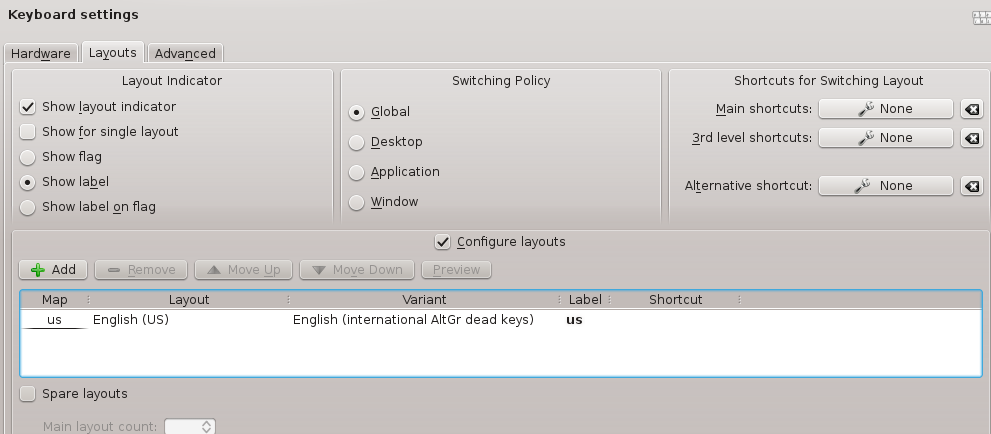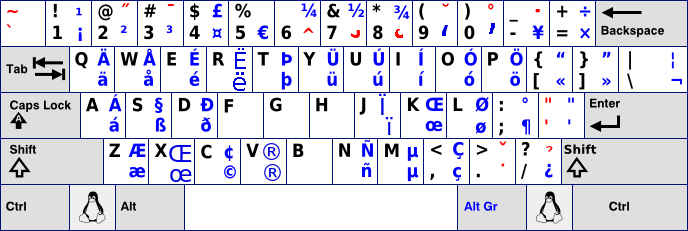Disclaimer
This information HAS errors and is made available
WITHOUT ANY WARRANTY OF ANY KIND and without even the
implied warranty of MERCHANTABILITY or FITNESS FOR A
PARTICULAR PURPOSE. It is not permissible to be read by
anyone who has ever met a lawyer or attorney. Use is confined to
Engineers with more than 370 course hours of engineering.
If you see an error contact:
+1(785) 841 3089
inform@xtronics.com
Bi Lingual computer setups
altgr-intl Setup
There is a need to type different symbols
Change layout
setxkbmap -rules evdev -model evdev -layout us -variant altgr-intl
Create ~/.xinitrc :
Section "InputClass"
Identifier "Keyboard Defaults"
MatchIsKeyboard "yes"
Option "XkbLayout" "us"
Option "XkbVariant" "altgr-intl"
EndSection
KDE Setup
- KDE 5.8 - Go to - in the system settings - go to
Input_devices/Keyboards (NOT with the other keyboard
stuff)
-
- On the first tab I have a Generic 101
- On the second tab - Layouts (you will want to stretch the
width so you can read it). You should end up with this:

-
- In the advanced tab set /Position of Compose key - Caps
Lock - this gets rid of the nasty Caps-lock key at
the same time
Usage
Holding the right-Alt-Key (AltGr) while pressing another key on
the US International Keyboard yields the blue characters depicted
in the layout below. Shown here is the PC104 (with 104 keys) which
will obviously differ slightly with many notebook layouts. Example
1: To type the Euro sign € hold the Alt-Gr and press 5 Example 2:
To type a capital C cedilla Ç hold both the Alt Gr and Shift keys
and press ,
 US
International (altgr-intl variant) Keyboard Layout
US
International (altgr-intl variant) Keyboard Layout
Dead-Keys
A dead key is different from a typical modifier key (such as
CTRL, or AltGr). Rather than being pressed and held while another
key is struck, a dead key is pressed and released before striking
the key to be modified.
In our use here, the dead-key-strokes are produced with
combinations of AltGr and sometimes the shift+AltGR.
There are 13 dead-key permutations under KDE on Debian..
First press the dead key (combination) then release the dead key
(combination), and subsequently type a letter. Example 1: To type
Ô, press AltGR+Shift+6, release and type O Example 2: To type ğ,
press AltGr + Shift + 9, release and type g
In some cases you can combine two diacritics like in ậ; first
press the dead keys for the circumflex and then the dead keys for
the underdot (or vice versa).
AltGr+6 then a number produces a super script of the number.
AltGr+7 produces a horn AltGr+8 produces a hook
Pressing a dead key followed by pressing the space bar produces
the character denoted by the dead key; e.g. ~ + space results in
“~”.
On a M$4000 keyboard - the key in-between the right-alt and
right-ctl
common
p π
Setting Compose Key
Go to KDE - systemsettings/hardware/keyboard/advanced
Enable config keyboard options
Disable annoying caps-lock
Set position of Compose key to caps-lock
See a long list of Compose key codes in"
/usr/share/X11/locale/en_US.UTF-8/Compose
commonly used codes here:
88 ∞
+- ±
oo °
Customizing Compose-Key .XCompose file
Create a ~/.XCompose file, and put the following lines into it:
## ~/.XCompose
# This file defines custom Compose sequences for Unicode characters
# Debian says -- but don't - too much cruft
#include "%L"
# testing
# Import default rules from the system Compose file:
#include "/usr/share/X11/locale/en_US.UTF-8/Compose"
# To put some stuff onto compose key strokes:
<Multi_key> <h> <h> : "♩" U2669 # QUARTER NOTE
<Multi_key> <h> <h> :"¼" onequarter # VULGAR FRACTION ONE QUARTER
<Multi_key> <h> <h> :"this is a test" # this is a test
<Multi_key> <8> <8> : "∞" U221e # 8 8 INFINITY
<Multi_key> <v> <slash> : "√" U221a # v / SQUARE ROOT
<Multi_key> <slash> <v> : "√" U221a # / v SQUARE ROOT
<Multi_key> <less> <equal> : "≤" U2264 # < _ LESS-THAN OR EQUAL TO
<Multi_key> <greater> <equal> : "≥" U2265 # > _ GREATER-THAN OR EQUAL TO
<Multi_key> <plus> <minus> : "±" plusminus # PLUS-MINUS SIGN
<Multi_key> <minus> <plus> : "±" plusminus # PLUS-MINUS SIGN
<Multi_key><slash> <equal> : "≠" notequal # NOT EQUAL TO
<Multi_key><tilde> <equal> :U2248 #approximately equal to
<Multi_key> <o> : "°" degree # DEGREE SIGN
<Multi_key> <O> <C> : "©" copyright # COPYRIGHT SIGN
<Multi_key> <O> <R> : "®" registered # REGISTERED SIGN
<Multi_key> <percent> <o> : "‰" U2030 # PER MILLE SIGN
<Multi_key> <c> <bar> : "¢" cent # CENT SIGN
#<Multi_key> <d> <slash> : "⌀" U2300 # DIAMETER SIGN
<Multi_key> <d> <slash> : "⌀" U00D8 # DIAMETER SIGN
<Multi_key> <bar> <equal> : "⏚" U23DA # Earth ground
<Multi_key> <1><slash> <4> : "¼" onequarter # VULGAR FRACTION ONE QUARTER
<Multi_key> <1> <slash><2> : "½" onehalf # VULGAR FRACTION ONE HALF
<Multi_key> <3> <slash><4> : "¾" threequarters # VULGAR FRACTION THREE QUARTER
# Musical alterations
<Multi_key> <numbersign> <q> : "♩" U2669 # QUARTER NOTE
<Multi_key> <numbersign> <e> : "♪" U266a # EIGHTH NOTE
<Multi_key> <numbersign> <E> : "♫" U266b # BEAMED EIGHTH NOTES
<Multi_key> <numbersign> <S> : "♬" U266c # BEAMED SIXTEENTH NOTES
<Multi_key> <numbersign> <b> : "♭" U266d # MUSIC FLAT SIGN
<Multi_key> <numbersign> <f> : "♮" U266e # MUSIC NATURAL SIGN
<Multi_key> <numbersign> <numbersign> : "♯" U266f # MUSIC SHARP SIGN
# GREEK CAPITAL LETTERS
<Multi_key> <G> <A> : "Α" U0391 # GREEK CAPITAL LETTER ALPHA
<Multi_key> <G> <B> : "Β" U0392 # GREEK CAPITAL LETTER BETA
<Multi_key> <G> <G> : "Γ" U0393 # GREEK CAPITAL LETTER GAMMA
<Multi_key> <G> <D> : "Δ" U0394 # GREEK CAPITAL LETTER DELTA
<Multi_key> <G> <E> : "Ε" U0395 # GREEK CAPITAL LETTER EPSILON
<Multi_key> <G> <Z> : "Ζ" U0396 # GREEK CAPITAL LETTER ZETA
<Multi_key> <G> <H> : "Η" U0397 # GREEK CAPITAL LETTER ETA
<Multi_key> <G> <I> : "Ι" U0399 # GREEK CAPITAL LETTER IOTA
<Multi_key> <G> <K> : "Κ" U039A # GREEK CAPITAL LETTER KAPPA
<Multi_key> <G> <L> : "Λ" U039B # GREEK CAPITAL LETTER LAMDA
<Multi_key> <G> <M> : "Μ" U039C # GREEK CAPITAL LETTER MU
<Multi_key> <G> <N> : "Ν" U039D # GREEK CAPITAL LETTER NU
<Multi_key> <G> <P> : "Π" U03A0 # GREEK CAPITAL LETTER PI
<Multi_key> <G> <R> : "Ρ" U03A1 # GREEK CAPITAL LETTER RHO
<Multi_key> <G> <S> : "Σ" U03A3 # GREEK CAPITAL LETTER SIGMA
<Multi_key> <G> <T> : "Τ" U03A4 # GREEK CAPITAL LETTER TAU
<Multi_key> <G> <U> : "Υ" U03A5 # GREEK CAPITAL LETTER UPSILON
<Multi_key> <G> <F> : "Φ" U03A6 # GREEK CAPITAL LETTER PHI
<Multi_key> <G> <X> : "Χ" U03A7 # GREEK CAPITAL LETTER CHI
<Multi_key> <G> <O> : "Ω" U03A9 # GREEK CAPITAL LETTER OMEGA
# DOUBLES (additional stroke <Q>)
<Multi_key> <G> <Q> <T> : "Θ" U0398 # GREEK CAPITAL LETTER THETA
<Multi_key> <G> <Q> <O> : "Ο" U039F # GREEK CAPITAL LETTER OMICRON
<Multi_key> <G> <Q> <X> : "Ξ" U039E # GREEK CAPITAL LETTER XI
<Multi_key> <G> <Q> <P> : "Ψ" U03A8 # GREEK CAPITAL LETTER PSI
# greek small letters
<Multi_key> <g> <a> : "α" U03B1 # GREEK SMALL LETTER ALPHA
<Multi_key> <g> <b> : "β" U03B2 # GREEK SMALL LETTER BETA
<Multi_key> <g> <g> : "γ" U03B3 # GREEK SMALL LETTER GAMMA
<Multi_key> <g> <d> : "δ" U03B4 # GREEK SMALL LETTER DELTA
<Multi_key> <g> <e> : "ε" U03B5 # GREEK SMALL LETTER EPSILON
<Multi_key> <g> <z> : "ζ" U03B6 # GREEK SMALL LETTER ZETA
<Multi_key> <g> <h> : "η" U03B7 # GREEK SMALL LETTER ETA
<Multi_key> <g> <i> : "ι" U03B9 # GREEK SMALL LETTER IOTA
<Multi_key> <g> <k> : "κ" U03BA # GREEK SMALL LETTER KAPPA
<Multi_key> <g> <l> : "λ" U03BB # GREEK SMALL LETTER LAMDA
<Multi_key> <g> <m> : "μ" U03BC # GREEK SMALL LETTER MU
<Multi_key> <g> <n> : "ν" U03BD # GREEK SMALL LETTER NU
<Multi_key> <g> <p> : "π" U03C0 # GREEK SMALL LETTER PI
<Multi_key> <g> <r> : "ρ" U03C1 # GREEK SMALL LETTER RHO
<Multi_key> <g> <s> : "σ" U03C3 # GREEK SMALL LETTER SIGMA
<Multi_key> <g> <t> : "τ" U03C4 # GREEK SMALL LETTER TAU
<Multi_key> <g> <u> : "υ" U03C5 # GREEK SMALL LETTER UPSILON
<Multi_key> <g> <f> : "φ" U03C6 # GREEK SMALL LETTER PHI
<Multi_key> <g> <x> : "χ" U03C7 # GREEK SMALL LETTER CHI
<Multi_key> <g> <o> : "ω" U03C9 # GREEK SMALL LETTER OMEGA
# doubles (additional stroke <q>)
<Multi_key> <g> <q> <t> : "θ" U03B8 # GREEK SMALL LETTER THETA
<Multi_key> <g> <q> <o> : "ο" U03BF # GREEK SMALL LETTER OMICRON
<Multi_key> <g> <q> <p> : "ψ" U03C8 # GREEK SMALL LETTER PSI
<Multi_key> <g> <q> <s> : "ς" U03C2 # GREEK SMALL LETTER FINAL SIGMA
<Multi_key> <g> <q> <x> : "ξ" U03BE # GREEK SMALL LETTER XI
and restart X.
en_Spanish dictionaries
- Install aspell-es myspell-es
Email

 US
International (altgr-intl variant) Keyboard Layout
US
International (altgr-intl variant) Keyboard Layout